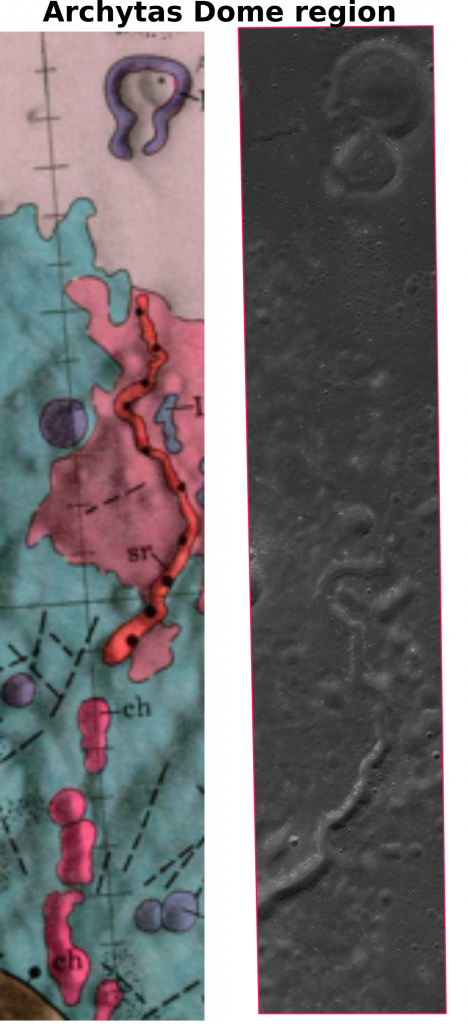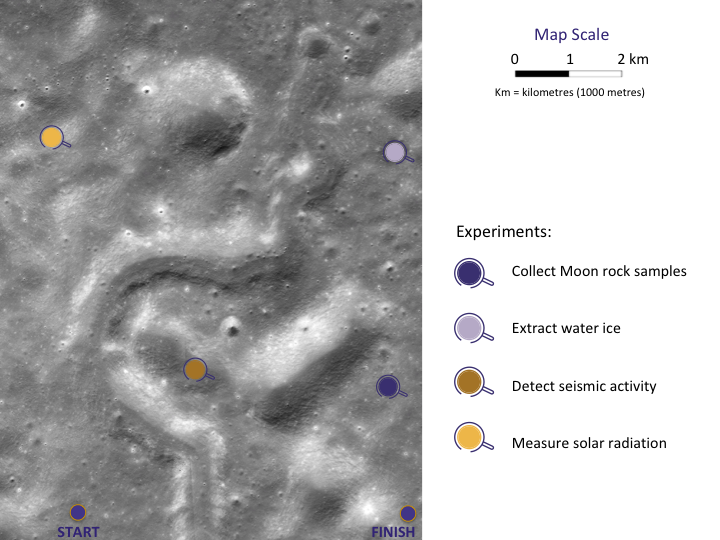Join the Challenge to Explore the Moon!
Europlanet Science Congress (EPSC) 2022 Press Release
Lunar enthusiasts of all ages are challenged to help identify features on the Moon that might pose a hazard to rovers or astronauts exploring the surface.
The 2022 EXPLORE Lunar Data Challenge is focused on the Archytas Dome region, close to the Apollo 17 landing site where the last humans set foot on the Moon 50 years ago this December.
The Machine Learning Lunar Data Challenge is open to students, researchers and professionals in areas related to planetary sciences, but also to anyone with expertise in data processing. There is also a Public Lunar Data Challenge to plot the safe traverse of a lunar rover across the surface of the Moon, open to anyone who wants to ‘have a go’, as well as a Classroom Lunar Data Challenge for schools, with hands-on activities about lunar exploration and machine learning.
Announcing the EXPLORE Machine Learning Lunar Data Challenge during the Europlanet Science Congress (EPSC) 2022 in Granada, Spain, this week Giacomo Nodjoumi said: “The Challenge uses data of the Archytas Dome taken by the Narrow Angle Camera (NAC) on the Lunar Reconnaissance Orbiter (LRO) mission. This area of the Moon is packed craters of different ages, boulders, mounds, and a long, sinuous depression, or rille. The wide variety of features in this zone makes it a very interesting area for exploration and the perfect scenario for this Data Challenge.”
The Machine Learning Lunar Data Challenge is in three steps: firstly, participants should train and test a model capable of recognising craters and boulders on the lunar surface. Secondly, they should use their model to label craters and boulders in a set of images of the Archytas zone. Finally, they should use the outputs of their models to create a map of an optimal traverse across the lunar surface to visit defined sites of scientific interest and avoid hazards, such as heavily cratered zones.
The public and schools are also invited to use lunar images to identify features and plot a journey for a rover. Prizes for the challenges include vouchers totalling 1500 Euros, as well as pieces of real Moon rock from lunar meteorites.
The EXPLORE project, which is funded through the European Commission’s Horizon 2020 Programme, gathers experts from different fields of science and technical expertise to develop new tools that will promote the exploitation of space science data.
“Through the EXPLORE Data Challenges, we aim to raise awareness of the scientific tools that we are developing, improve their accuracy by bringing in expertise from other communities, and involve schools and the public in space science research,” said Nick Cox, the Coordinator of the EXPLORE project.
The deadline for entries closes on 21 November 2022 and winners will be announced in mid-December on the anniversaries of the Apollo 17 mission milestones.
The 2022 EXPLORE Data Challenges can be found at: https://exploredatachallenges.space
Link to press release:
Images
The Archytas Dome region of the lunar surface is the target area for the EXPLORE Lunar Data Challenges 2022. Credit: NASA/GSFC/Arizona State University/EXPLORE/Jacobs University.
https://exploredatachallenges.space/wp-content/uploads/2022/09/Archytas2.png

The Public Lunar Challenge asks participants to identify hazards on the Moon, visit areas of scientific interest and plot a journey for a rover. Credit: NASA/GSFC/Arizona State University/EXPLORE
https://exploredatachallenges.space/wp-content/uploads/2022/09/Features-labelling.png

Science Contacts
Giacomo Nodjoum
Jacobs University
Bremen, Germany
g.nodjoumi@jacobs-university.de
Nick Cox
Coordinator, EXPLORE Project
ACRI-ST
nick.cox@acri-st.fr
Media Contacts
EPSC2022 Press Office
+44 7756 034243
epsc-press@europlanet-society.org
Further Information
About EXPLORE
The EXPLORE project gathers experts from different science domains and technological expertises to develop new tools that will enable and promote the exploitation of space science data. Through EXPLORE, we are creating a series of scientific data applications (Apps) that support users who interact with the large space science data archives maintained by space agencies, observatories and other facilities (e.g. ESA Datalabs or ESCAPE SAP). Our applications will equip researchers with state-of-the-art Artificial Intelligence (AI) and visual analytics to enhance science return and discovery from ‘big data’, initially focusing on data from the Gaia mission (investigating the Milky Way galaxy and stars) and from various missions to explore the Moon. The EXPLORE Data Challenges aim to raise awareness of the Apps produced by the EXPLORE project, and to improve the accuracy of the Apps by harnessing expertise from other data analysis fields.
This project has received funding from the European Union’s Horizon 2020 research and innovation programme under grant agreement No 101004214. https://explore-platform.eu
About the Europlanet Science Congress (EPSC)
The Europlanet Science Congress (https://www.epsc2022.eu/) formerly the European Planetary Science Congress, is the annual meeting of the Europlanet Society. With a track record of 16 years, and regularly attracting around 1000 participants, EPSC is the largest planetary science meeting in Europe. It covers the entire range of planetary sciences with an extensive mix of talks, workshops and poster sessions, as well as providing a unique space for networking and exchanges of experiences. In 2022, EPSC is held jointly with the European Astrobiology Network Association (EANA) annual meeting.
Follow on Twitter via @europlanetmedia and using the hashtag #EPSC2022.
Details of media briefings and recordings can be found at: https://www.europlanet-society.org/press-briefings-at-epsc2022/
All Europlanet media releases can be found at: https://www.europlanet-society.org/press/
About Europlanet
Since 2005, Europlanet (www.europlanet-society.org) has provided Europe’s planetary science community with a platform to exchange ideas and personnel, share research tools, data and facilities, define key science goals for the future, and engage stakeholders, policy makers and European citizens with planetary science.
The Europlanet 2024 Research Infrastructure (RI) has received funding from the European Union’s Horizon 2020 research and innovation programme under grant agreement No 871149 to provide access to state-of-the-art research facilities and a mechanism to coordinate Europe’s planetary science community.
The Europlanet Society promotes the advancement of European planetary science and related fields for the benefit of the community and is open to individual and organisational members. The Europlanet Society is the parent organisation of the Europlanet Science Congress (EPSC).
About EANA
The European Astrobiology Network Association (http://www.eana-net.eu), joins together people interested in the origins of life and the search for extraterrestrial life in the Solar System and beyond. This interdisciplinary domain involves scientists from multiple disciplines such as chemistry, physics, biology, geology, astronomy, and human sciences.

